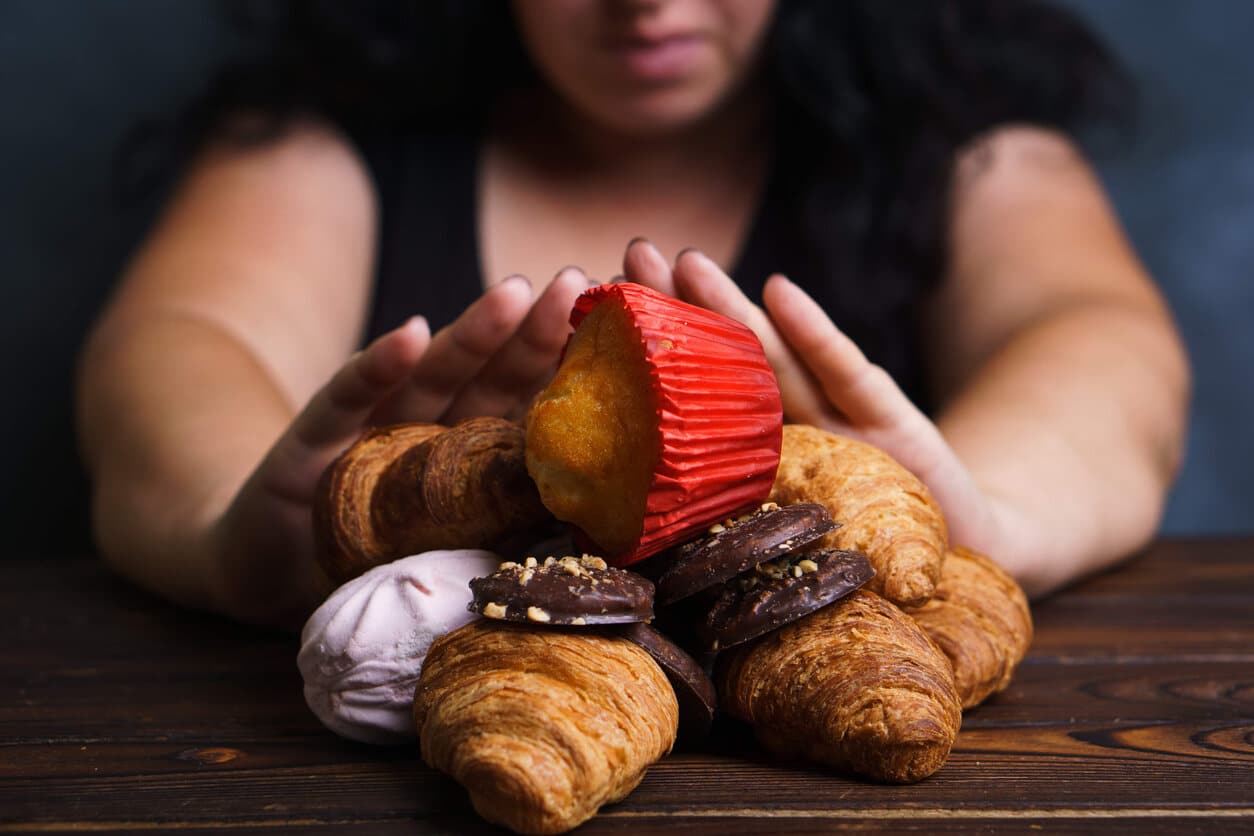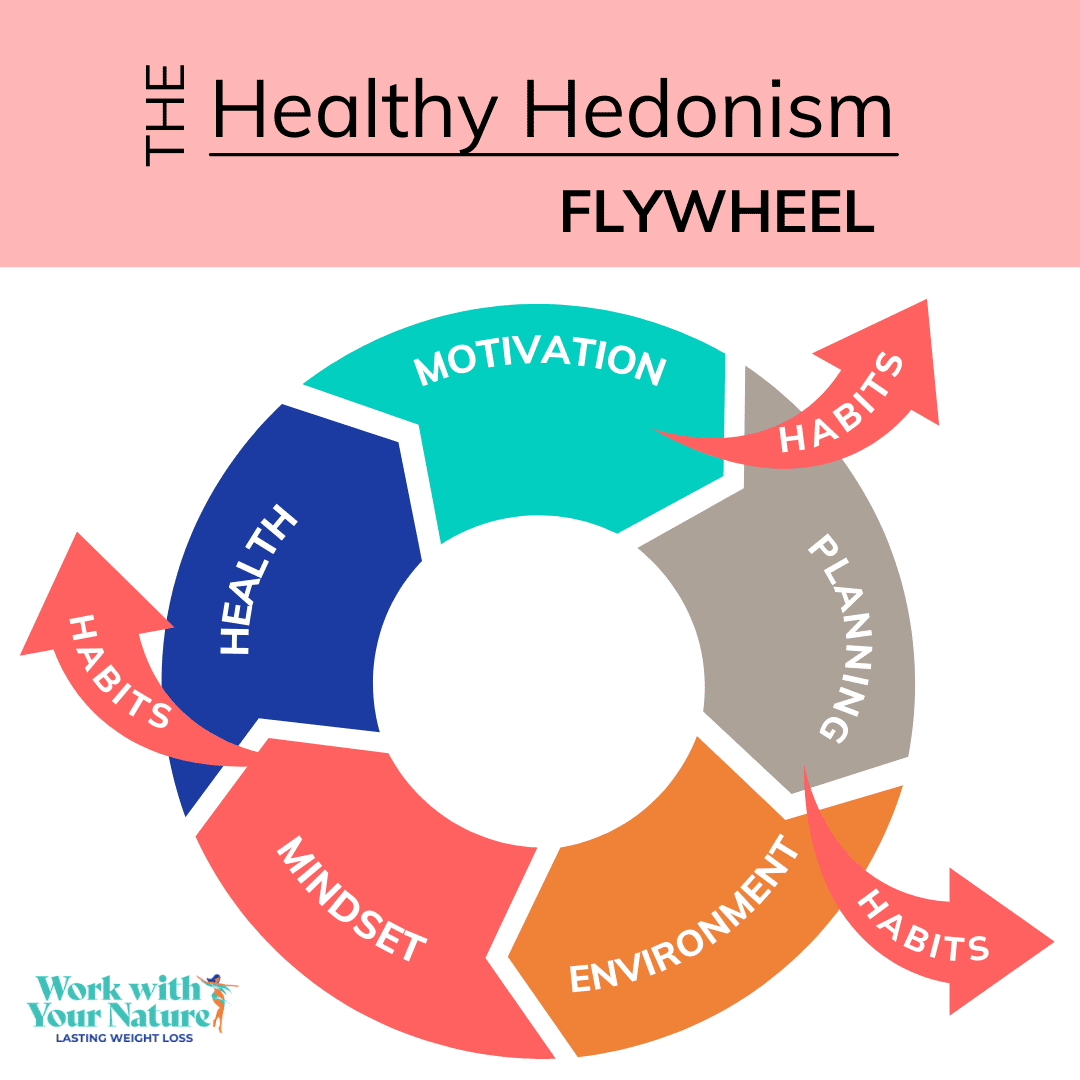The “old me” would stop trying and I would just indefinitely go on a binge”
“I felt like I had to cross an ocean to reach my goal weight and I kept losing steam”
These are quotes from clients expressing the very real sentiment that sticking to a weight loss plan or a “diet” is hard work and usually fails.
There are many reasons for this and often those reasons are unique to the individual.
But once we understand human nature we can harness that knowledge to make the process much easier and more pleasurable.
One of the biggest myths out there is that if you just had more willpower you would be successful.
All you have to do is be stronger. If you don’t have enough willpower it just means you’re weak and probably lazy.
This is just not true.
And it hurts us.

You are betting against human nature if you expect willpower to help you stay on track. And this is a surefire way to fail.
Willpower is unreliable.
I repeat: willpower is unreliable.
Improving your health habits is all about making decisions.
You either make a decision that is beneficial to your health or one that is not.
Whenever you make a decision you are using both the rational, logical, forward-thinking part of your brain (prefrontal cortex or PFC) AND the more primal parts of your brain (amygdala, hippocampus, and hypothalamus).
In many ways, it is appropriate to think of these two areas of the brain as being in competition.
Your PFC can be referred to as the “higher brain” and the more primal parts of your brain as the “lower brain”.
The higher brain wants what’s best for you in the long run. The lower brain wants what’s best for you RIGHT NOW.
When you are stressed, tired, frustrated, bored or in any way not at your best, your PFC is compromised.
Willpower is evoked from the PFC or higher brain.
So, it is not reliable when you are not at your best.
Your lower brain will take over, compelled by instincts, emotions, and base desires and fears.
Now for a moment let’s bring motivation into the conversation.
Motivation can protect you from the whimsical nature of willpower in many cases.
If you want something badly enough, you will muster the willpower, push aside that primal brain talk and get it done.
But in order for motivation to truly be your friend, you have to give it lots of attention.
Motivation is like a delicate flower, you have to give it attention, love, and protection or it will wither.
Nourish your motivation every day.
Make sure you are intimately connected to WHY you want to reach your health goals.
Not just long-term aspirations and desires like aging gracefully.
It’s not enough to strongly desire to reach a certain weight.
Those are all for “future you” to deal with.
While long-term goals are important and CAN be a source of motivation, they are just not all that compelling when you are staring at a brownie or you aren’t in the mood to work out.
It’s more powerful to set up short-term, in-your-face, and impactful objectives.

You have to set up what I call “short-term, reinforcing feedback loops”.
These can be positive or negative feedback loops.
A feedback loop is a loop that gives you a certain outcome based on your input.
So, if you eat a bunch of candy, you may feel nauseous for hours afterward. That is a negative feedback loop. It makes you stop wanting to eat a bunch of candy next time.
Or, if you eat a healthy meal and you feel energized, clear-headed, and get a great night’s sleep you want to repeat that. That is a positive feedback loop.
Negative feedback loops are not as effective because they require what is called “stop” behavior. In other words, saying “NO, I will not eat that brownie”.
Stop behavior is harder for we humans to muster. That is just how we are designed.
Positive actions are known as “start” behavior. Start behavior is much easier for us to do consistently.
Focusing on adding in good actions is much easier and effective than focusing on stopping bad actions.
These can create positive feedback loops, which tend to be very powerful and can have a “flywheel effect”.
That is when just by doing a good thing, more good things happen and keep happening as a result.
The flywheel keeps spinning and the more often you do those things, the flywheel can even speed up.
Basically, you are creating positive momentum.
And if you keep it up for long enough eventually you develop HABITS. And once you’ve done that, now you are really cooking. The flywheel feels effortless.
Your healthy habits take little to no willpower and your motivation becomes less important.
The cool thing to note here is that your lower brain is a major player in habitual behaviors.
Your lower brain WANTS YOU to continue your habits because those neural pathways are so strong.
It doesn’t matter if the habit is healthy or not.
But when you have healthy habits your higher brain wants you to continue those habits as well.
So, now your lower brain and your higher brain areas are aligned!
This is important because motivation cannot protect you all the time.
I also suggest making sure your environment is set up for success (this is part of the flywheel). Don’t have junk food easily accessible. Make it easy to start exercising or being physically active. Have plenty of healthy, quick, and tasty options easily available to you.
Planning is key to this whole process.
To bring it all together in an illustration I created a visual of the flywheel (I call it the Healthy Hedonism Flywheel). As you input more motivation, more planning, improve your environment, and work on your mindset the wheel spins more and more and faster and faster.
And out spin habits!!

The habits can include many of the practices in the flywheel such as good planning, nurturing your motivation, and improving your mindset.
And they can be any of the other wonderful habits you are cultivating with your flywheel efforts.
Remember, willpower is not really your friend.
But creating the flywheel of healthy hedonism will put you on your path to more pleasurable and successful weight loss and higher health.
Sometimes the process of losing weight and gaining health can seem so confusing and/or overwhelming. How do you know where to start? How do you know what diet is right for you? How do you keep up the motivation?
I offer free clarity calls where we will discuss your goals and your challenges so we can connect the dots and give you clarity on the next best steps for you.
